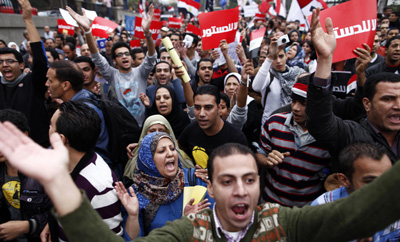New York, December 7, 2012–CPJ condemns a series of attacks on journalists covering protests in Cairo over the proposed constitution and calls on authorities to investigate the assaults and bring an immediate end to the anti-press violence. At least five journalists were struck by rubber bullets, leaving one in critical condition, and several others were assaulted, according to news reports.
“Journalists have played a key role throughout Egypt’s transition, reporting on developments within the country and informing the entire world,” said CPJ Executive Director Joel Simon. “It is President Morsi’s responsibility during the current unrest to ensure that journalists are able to do their job. Authorities should launch an investigation into these horrific attacks immediately and bring the perpetrators to justice.
Thousands of protesters took to the streets outside President Mohamed Morsi’s presidential palace over the past week to demonstrate against a proposed constitution that local and international human rights and press freedom organizations have said limits minority rights and freedom of expression. A public referendum scheduled for December 15 has helped trigger the current crisis.
On Wednesday, Al-Hosseiny Abou Deif, reporter for the private weekly El-Fagr, was shot in the head at close range with a rubber bullet by an individual who local journalists and news reports said was a supporter of the Muslim Brotherhood party, according to news reports. Abou Deif, whose camera was also taken, was covering protests near the presidential palace at the time of the attack and had filmed Muslim Brotherhood supporters beating up protesters and using live ammunition, news reports said.
Abou Deif sustained severe injuries to his brain, head, and neck, and was in a coma on Friday, according to Mustafa Thabit, director of El-Fagr website. Doctors said that Abou Deif had severe brain damage since the bullet had penetrated his skull, Thabit told CPJ.
The Egyptian Journalists Syndicate released a statement on Thursday saying they had filed a complaint with the Prosecutor General against members of the Muslim Brotherhood’s Freedom and Justice Party for inciting violence against journalists. The Muslim Brotherhood did not immediately respond to the complaint.
At least four other journalists were also injured by rubber bullets while covering protests near the presidential palace. Mohamed Azouz, reporter for the state-run daily Al-Gomhuria, was hit in the face by a rubber bullet, news reports said. News accounts reported that Osama al-Shazzly, a reporter for the private daily El-Badil; Mohamed Saad, a freelance journalist who contributes to local news websites; and Ahmed Abd al-Salam, a reporter for the private daily Al-Alam al-Yawm, had also been struck by rubber bullets. News reports did not offer further details or say whether the attacks were linked.
Another journalist, Ahmed Khair, a reporter for the private satellite broadcaster ONTV, was beaten by Muslim Brotherhood supporters while covering the protests near the presidential palace, according to news reports. Another ONTV journalist, Kareem Fareed, was briefly taken captive by supporters of the party, news reports said. An unspecified number of TV journalists working for the private broadcaster CBC were also assaulted while covering the same events, news reports said. The reports did not offer further details.
In a separate development, CBC TV presenter Khairy Ramadan also resigned in protest on Thursday after the broadcaster banned former presidential candidate Hamdeen Sabbahi from being interviewed on-air, according to news reports. This comes a day after dozens of journalists from the state-run daily, Al-Ahram protested in front of the paper’s offices against the paper’s editorial policy, news reports said.
On Tuesday, CPJ had supported the Egyptian Journalists Syndicate’s call to Morsi to not submit the proposed constitution to the December 15 referendum.
- For more data and analysis on Egypt, visit CPJ’s Egypt page here.
